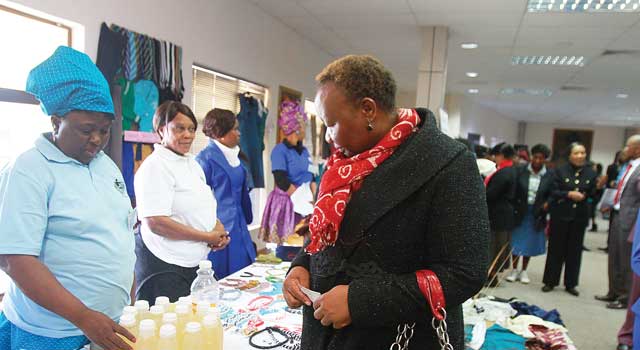OAITSE MATHALA
Standard Chartered Bank Botswana (SCBB) has donated P1 million to Women’s Finance House Botswana (WFHB). With Botswana having moved from the low-income status into the middle-income category, donors from around the world moved away from assisting a number of initiatives in the country. WFHB was not an exception as various donors who had been keeping its good cause alive pulled away.
WFHB, also known as Thusang Basadi, is a Non-Governmental Organisation which was established and incorporated in 1989 with the main objective to alleviate poverty and provide access to financial services to low income women entrepreneurs. This was meant particularly for those women at a micro level and do not have access to the services provided by financial institutions like banks and other lenders.
The NGO empowers women registered with it economically by providing them with micro loans, and further to that, they provide basic business training and other business support services. However, the institution has indicated that it faces challenges of lack of resources to fully discharge its mandate of financial inclusion.
“We relied on donor funders and as Botswana got into the middle income status the donors moved away, and we had to come up with ideas as to how we were going to get income,” WFHB Program Director, Victoria Masenya said during the client day and business forum they held in collaboration with Standard Chartered Bank Botswana last week.
WFHB entered into a strategic partnership with Standard Chartered Bank last year, a partnership that saw the bank making a commitment to inject P1 million into the organisation’s loan fund. The bank will also offer financial literacy workshops to WFHB clients and also provide institutional support through professional expertise and mentoring services to the organisation. Masenya said SCBB also helped in the formulation of their commercial policies.
She said currently they operate in both the central and southern parts of the country, noting that they have not been able to go all out to market themselves because of lack of resources. Plans to expand their outreach are there and will be executed once resources are available. “Operational expansion comes with resources,” she highlighted during a sideline interview with members of the press.
Masenya said they have about 9, 000 clients. “Some of them are accessing micro loans and some are already savers,” she said. After accessing the loans and injecting them into their businesses, they are encouraged to save and pay back the loans in instalments. The loans are only accessible in groups of citizen women aged between 21 and 65. The loans range between P750 and P20, 000. Masenya noted that they do not struggle with defaults as more than 95 per cent of their clients are able to pay back the money loaned to them.
SCBB Head of Corporate Affairs, Itumeleng Ramsden, noted that the P1 million injection into the WFHB loan fund is a donation from them. She said they need a partner like WFHB to be able to provide financial assistance to low income businesses.
“We are also looking at the fact that financial inclusion is such an important agenda. We feel that they need to be helped,” she explained. She said theirs with WFHB is a three year partnership and will be reviewed for possible renewal when its duration lapses.
Minister of Health, Dorcas Makgato, formerly Minister of Trade and Industry was amongst the speakers on the day; she encouraged the businesswomen to be competitive and also diversify their businesses. “You should come up with new business ideas that would end up creating employment for other people,” she advised.

